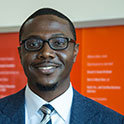
Elizabeth A. Jach
University at Albany, State University of New York
See the current and past recipients of the Paul P. Fidler Research Grant.

University at Albany, State University of New York
Examining Social Support and Internalized Sexism among Sophomores on Women’s Intercollegiate Athletic Teams
While sexism remains omnipresent within intercollegiate athletics, internalized misogyny is a consequence often overlooked. This mixed methods project will examine to what extent social support may reduce internalized sexism among sophomores on women’s intercollegiate athletic teams. Participants will complete a survey and opt into a follow-up focus group. Findings will assess what social supports matter for addressing internalized misogyny among sophomores on women’s intercollegiate athletic teams, with implications informing educators such as coaches, athletic support staff, faculty, and student affairs professionals on how to best engage sophomores on women’s intercollegiate athletic teams in experiences that prioritize reducing internalized misogyny.
Dr. Jamil Johnson, Associate Director for Research and Grants at the National Resource Center for The First-Year Experience and Students in Transition expects Dr. Jach’s research will help to illuminate the effects of internalized sexism among women’s intercollegiate athletic teams.
“I expect this study will clarify the best practices for professionals on how to best support women’s athletics.” Johnson said. “I am excited to see the impact of these research findings on how we - as educators, administrators, and advocates – support and positively help shape the experiences of women in sports.”

Appalachian State University

Appalachian State University
A Qualitative Examination of Trauma, Well-Being, & Success of First-Year Students at Historically Black Universities
Before arriving on campus, 40% of students are likely to have experienced one or more traumatic events, with Black youth experiencing higher exposure rates (61%). These experiences have negative impacts on outcomes including academics, social mobility, and health. While the literature continues to explore the impact of trauma on college campuses, few studies center outcomes and mitigating factors regarding trauma within the context of HBCUs. This qualitative study seeks to understand the experiences of first-year HBCU students who were exposed to trauma, and factors that led to their resilience success as well as outcomes based on intersecting social identities.
Jennifer R. Keup, Executive Director of the National Resource Center for The First-Year Experience and Students in Transition, expects Lynch and Ricks’ research will help to illuminate the effects that traumatic events have on first-year students at Historically Black Universities and how it impacts their quality of life.
“Currently, since there is limited research and studies that have been published on the specific factors regarding trauma within Historically Black Universities, I expect this study will clarify the best practices for preparing students at these institutions for their best success,” Keup said. “I’m excited to see the impact of these research findings on how we, as educators and administrators, can become prepared to positively help shape the experiences of first-year HBCU students in light of traumatic events.”

California State University, Fresno

California State University, Fresno

California State University, Fresno
Navigating the Central Valley: Exploring Undocumented Students’ Pursuits and Transitions into Higher Education
Using platica methodology (Fierros & Delgado Bernal, 2016), Hernandez's research study examines the institutional, financial, and social challenges that undocumented college students face in California’s Central valley and the navigational strategies they employ as they transitioned from high school to college. The findings of this study will enhance academic and public understandings on how to better support undocumented students’ post-secondary educational pursuits and transitions as well as inform ongoing efforts to create an UndocuAlly training program for faculty and staff at Associate granting and Bachelor’s granting institutions as well as high schools.
Jennifer R. Keup, Executive Director of the National Resource Center for The First-Year Experience and Students in Transition, expects Hernandez’s research will shed new light on the experiences of undocumented students journey into and through higher education.
“Of the myriad of topics that can be addressed through studies in this space, there is no question that the collegiate journey of undocumented students is extremely relevant right now,” Keup said. “I’m excited to see the impact of these research findings on the understanding of what undocumented students face in college and hopefully position higher education practitioners and administrators to better serve these students along their journey."

University of Wisconsin - Madison
Google Scholar
LinkedIn
Piecing Together the Community College Puzzle: How Autistic Students Transition Into and Through Community College
A qualitative case study that examines how autistic students transition into and thought
community college. Nachman utilizes Neurodiversity and Critical Disability Theory
to frame his understandings of autistic students’ experiences. The study employs surveys,
interviews, observations, written reflections, and document analysis to obtain insights
from autistic students, college staff, and people who students nominate. Preliminary
findings suggest the importance of possessing strong parental and peer networks, concurrently
engaging in a college autism support program, and finding fruitful majors and careers
as positive influencers shaping students as they lead into, start out at, and progress
through community college.
Dallin George Young, Assistant Director for Research and Grants at the National Resource Center for The First-Year Experience and Students in Transition, led the Paul P. Fidler Research Grant selection process. He anticipates Nachman’s research will contribute to our overall understanding of student transitions as we learn more about students with autism and their stories about finding community and navigating their college experience.
“This study is an important one as it will open our understanding of students’ transitions by broadening the conversation in meaningful ways. I am delighted that we get to support research that will contribute greater knowledge about the transition experiences of students with autism. Further, it is really exciting to see what we learn about this group of students’ experiences in community colleges, institutions that have long been at the vanguard of creating opportunities for access and innovating learning and pathways for student success. It is a pleasure to be able to support Brett as he carries out this research.”

George Mason University
Google Scholar
LinkedIn
Transitioning OUT: Lesbian, Gay, and Bisexual Students’ Experiences in the Senior Year
A qualitative exploration of the transition out of college will draw on interviews with 20 lesbian, gay, and bisexual graduating seniors. This study aims to contribute to our understanding of how identification with a sexual minority group impacts educational transitions broadly and the transition out of college in particular. Specifically, this research will focus on understanding how lesbian, gay, and bisexual students experience and navigate the senior year transition. The results will be used to inform faculty, student affairs personnel, and administrators as they seek to improve the experiences and resources available to college seniors.
Dallin George Young, Assistant Director for Research, Grants, and Assessment at the National Resource Center for The First-Year Experience and Students in Transition, led the Paul P. Fidler Research Grant selection process. He anticipates Silver’s research will help spark discussion and research not only on the research of LGBT+ students’ transition experiences in college but other aspects of institutions targeting specific populations.
“I am enthusiastic about this project, for two reasons. First - and I think it is important to name this - this is the first time the Fidler research grant is supporting a study explicitly focused on Lesbian, Gay, and Bisexual Students. I am thrilled that we have been given the opportunity to support research about this population of students. Second, I am excited that we are supporting more research on the senior year and how student identities influence the transition out of higher education into the rest of their lives. I look forward to supporting Dr. Silver as he engages in this study..”

Appalachian State University
LinkedIn

Appalachian State University
ResearchGate
LinkedIn
Academically Achieving Black Males at HBCUs: A Mixed-Methods Study of First Year Students’ Academic and Transitional Success
The research on Black males continues to narrowly focus on achievement gaps, problems, and underrepresentation of Black males in higher education. Limited research points to academically achieving Black male students and their successful first year college transitions. Even more absent is the research on the transitions of successful first-year Black males at HBCUs. Consequently, this cross-institutional collaborative mixed-methods study focuses on academically achieving Black males’ relationships to learning and achievement, and skills, habits, and characteristics of successful transitioning Black males within the 10 HBCUs in North Carolina. Practice and research implications for this study are expansive and promising.
Dallin George Young, Assistant Director for Research, Grants, and Assessment at the National Resource Center for The First-Year Experience and Students in Transition, led the Paul P. Fidler Research Grant selection process. He anticipates Sheppard and Bryson’s research will help spark discussion and research not only on the research of high achieving males at HBCUs but other aspects of institutions targeting specific populations.
“I am enthusiastic about this project, for two reasons. First, this is the first time the Fidler research grant is supporting a study focused on HBCUs. I am thrilled that we have been given the opportunity to support research about students at these institutions. Second, this study is an ambitious, creative, rigorous, and assets-based approach to understanding the factors that are present as Black men successfully enter and engage with the academy. I look forward to supporting Drs. Sheppard and Bryson as they engage in a study that will involve HBCUs across North Carolina - a state perfectly situated for this kind of research.”

University of Wisconsin
ResearchGate
Academia
LinkedIn
Our Stories (Un)Told: Community Cultural Wealth and the College-Going Experiences of Transitioning Youth in Foster Care.
The purpose of this proposed study is twofold: (a) to better understand the college choice and enrollment process for underserved and nontraditional populations in foster care; and (b) to explore how academically high-achieving foster youth cultivate and leverage cultural wealth (Yosso, 2005) to enhance their access to selective four-year colleges, where they are traditionally underrepresented (see Davis, 2005; Day, Dworsky, & Feng, 2013). The ultimate aim of this interdisciplinary study is to offer implications to concerned stakeholders in education and child welfare who endeavor to close persistent inequities in postsecondary participation.
Dallin George Young, Assistant Director for Research, Grants, and Assessment at the National Resource Center for The First-Year Experience and Students in Transition, led the Paul P. Fidler Research Grant selection process. He anticipates Amechi's research will significantly contribute to the national discussion on how to improve the transition into and through higher education for foster youth.
"I am enthusiastic about this project, because it promises to provide insight into issues facing the transitions of one of our country's most vulnerable populations in higher education. This research will uncover the assets used by foster youth as they successfully make their way into the academy. Understanding the sources of cultural wealth available in their communities will help inform educators who are responsible for creating conditions that will help support continued achievement of students with experience in the foster care system."


University of Alabama
LinkedIn


University of Alabama
LinkedIn

University of Alabama
Identity Intersections: Sense of Belonging and its Influence on Academic Success for Residential Students Across Racial and Gender Identities
Belongingness matters greatly to college student success, yet the ways in which students experience belonging vary greatly across racial and gender identities. Residence halls have the potential to shape students' sense of belonging because of the amalgamation of academic and social spaces. Using Strayhorn’s (2012) model for sense of belonging, our proposed research focuses on belongingness in residence halls and its relationship to academic success across racial and gender identities. Using a mixed methods approach, our proposed research will add to the complex narrative between belonging, academic success, and identity.
The findings from Identity Intersections: Sense of Belonging and its Influence on Academic Success for Residential Students Across Racial and Gender Identities can be found in the Journal of The First-Year Experience & Students in Transition.
Dallin George Young, Assistant Director for Research, Grants, and Assessment at the National Resource Center for The First-Year Experience and Students in Transition, led the Paul P. Fidler Research Grant selection process. He anticipates Garvey's research will significantly contribute to the national discussion on sense of belonging on campus and its relationship to academic success, including student retention.
“This is an exciting research project that will open a window into how campus environments, particularly residence halls, can be shaped as places where students feel they belong. Sense of belonging is related to a number of important educational outcomes including academic success, commitment, and satisfaction, all of which increase the chances that students will stay in school and complete their studies. Moreover, this mixed methods approach will allow the team to improve our understanding of the nuanced relationships between belongingness, success, and identity.”

Miami University (Ohio)
ResearchGate
Academia
LinkedIn
Thriving in Transitions: A Phenomenological Study on Latino Male Achievers at Selective Public Research Universities
This study will provide a different response to concerns about Latino males “effectively vanishing from the American higher education pipeline” (Saenz & Ponjuan, 2009, p. 54). Instead of examining factors that contribute to Latino male college students’ underperformance, this qualitative study will explore how 25 juniors and seniors employed different forms of capital to thrive academically, intrapersonally, and interpersonally at five selective public research universities. Implications for research, policy, and practice will focus on capitalizing on the knowledge, skills, and resources that Latino males possess and use to thrive in higher education.
The findings from the Capitalizing on Interpersonal Thriving: Exploring the Community Cultural Wealth in Latino Undergraduate Men's Peer Networks article can be found in the Journal of The First-Year Experience & Students in Transition.
Dallin George Young, Assistant Director of Research, Grants, and Assessment at the National Resource Center for The First-Year Experience and Students in Transition, led the Paul P. Fidler Research Grant selection process. He anticipates Perez’s research will significantly contribute to the national discussion on improving the success of Latino males in postsecondary education.
“I am very excited about this research project, as it tackles an important issue in higher education in a thoughtful and creative manner. Understanding Latino male success by focusing on their assets rather than deficits is a promising approach to identifying educationally effective and purposeful conditions that will lead to improved achievement. Moreover, the combination of ‘thriving’ and ‘community cultural wealth’ is an original and inventive concept that will contribute to practical and theoretical understanding of success for Latino students, specifically, as well as all students, generally."

Bloomsburg University

Auburn University
STEMing the Shock: “Transfer Shock” and its Impact on STEM Major and Enrollment Persistence
Students who transfer between two- and four-year institutions often experience "transfer shock," or a reduction in academic performance during this critical transition. Research suggests transfer shock, although temporary, may reduce student persistence in their major. Using a mixed methods approach, this study explores the role transfer shock plays in STEM major and degree persistence. More specifically, we examine the impact of transfer shock on persistence by understanding how STEM majors experience transfer shock and exploring the student and institutional factors that affect transfer shock and academic success. Results will have important implications for creating a viable community college–STEM career pathway.
The findings from the STEMing the Shock article can be found in the Journal of The First-Year Experience & Students in Transition.
Dallin George Young, Assistant Director of Research, Grants, and Assessment at the National Resource Center for The First-Year Experience and Students in Transition, led the Paul P. Fidler Research Grant selection process. He anticipates Elliott and Lakin's research will significantly contribute to the national discussion on understanding the factors that support transfer student success.
"This ambitious project is very promising because it will shed light on how transfer shock is manifest in ways that depend on the academic programs transfer students choose. Most importantly, this knowledge will better equip faculty and staff to develop approaches to help increase transfer student success in science, technology, engineering, and math. The results are likely to point to means of moving away from one-size-fits-all approaches for supporting transfer students, particularly those majoring in STEM areas."

Sam Houston State University

University of Southern Mississippi
Distinguishing Differences in the Academic Motivation of Entering and Persisting Transfer Students
Transfer student populations continue to grow in higher education. These students may struggle to find a sense of belonging and experience limited opportunities for engagement given work, life, and family commitments. Belonging predicts increased levels of engagement and academic success among traditional students. However, few researchers examine this theoretical model among transfer students, limiting its generalizability. To bridge this gap, we propose to use a multi-group path analysis to test the relationship between belonging (i.e., university attachment), engagement, and academic success among entering and persisting transfer students. Results may guide practitioners in the prioritization of outcomes for transfer student programs.
The findings from Distinguishing Differences in the Academic Motivation of Entering and Persisting Transfer Students article can be found in the Journal of The First-Year Experience & Students in Transition.
Dallin George Young, Assistant Director of Research, Grants, and Assessment at the National Resource Center for The First-Year Experience and Students in Transition, led the Paul P. Fidler Research Grant selection process. He anticipates Lane and Martin's research will significantly contribute to the national discussion on understanding the factors that support transfer student success.
"The study that will be carried out by Drs. Lane and Martin is important as it will test widely held assumptions that institutional attachment, or sense of belonging, is an important antecedent to academic success for transfer students. The results of this research will help faculty and staff understand how to better support transfer students who may have difficulties finding a sense of belonging in their new institutional environments. Understanding the roles of attachment and engagement in transfer student success will give higher education professionals tools to help support the large number of these students in American higher education."

Ohio University
Meaning-Making Dynamics of Emancipated Foster Care Youth Transitioning Into Higher
Education:
A Constructivist-Grounded Theory
The purpose of this study is to investigate developmental meaning-making dynamics of emancipated foster youth transitioning into higher education. The study seeks to postulate alternative ways of conceptualizing college student transitional experiences and promote student developmental outcomes in ways that acknowledge a student's individual needs, goals, and values. Additionally, using a constructivist student development theoretical lens informed by grounded theory methodology, the study advances substantive theories and offers insights into how student affairs professionals and mentors can empower emancipated youth to formulate systems of meaning that creatively help inform the student's quest for an integral sense of identity and purpose.
The findings from Meaning-Making Dynamics of Emancipated Foster Care Youth Transitioning into Higher Education: A Constructivist-Grounded Theory article can be found in the Journal of The First-Year Experience & Students in Transition.
Dallin George Young, Assistant Director of Research, Grants, and Assessment at the National Resource Center for The First-Year Experience and Students in Transition, led the Paul P. Fidler Research Grant selection process. He anticipates Okumu's research will significantly contribute to the national discussion on understanding the needs of emancipated foster youth who are making the transition into higher education.
"Jacob's study will make a significant contribution to the literature about developmental theory related to students who have experiences in foster care. Further, it will provide a practical framework for faculty and staff who work to support these students as they develop the meaning-making abilities that will make them successful in higher education and beyond."

University of Northern Iowa
Exploring the Impact of Transfer Capital on Community College Transfer Students
This paper reports on one aspect of a larger study designed to re-examine the Laanan-Transfer Students’ Questionnaire (L-TSQ), an instrument exploring adjustment following transfer to a four-year institution (Laanan, 1998, 2004). In particular, it reports on nine new constructs added to the L-TSQ, which expand the understanding of transfer student capital. Results suggest that transfer student capital plays an important role in community college student success at the university. Transfer student capital is a significant predictor of university GPA, indicating that students with higher levels of transfer student capital (determined by collaboration and experiences with faculty at the community college and motivation and self-efficacy) academically outperformed those with lower levels. Also, mentoring (a component of transfer student capital) is a significant predictor of students' ability to cope actively with their problems. Finally, students with greater transfer student capital, as measured by experiences with financial knowledge and general courses and formal collaboration with faculty at the community college, have higher levels of satisfaction with academics and advising at the university.
The findings from Exploring the Impact of Transfer Capital on Community College Transfer Students article can be found in the Journal of The First-Year Experience & Students in Transition.
Ryan Padgett, Assistant Director of Research, Grants, and Assessment at the National
Resource Center for The First-Year Experience and Students in Transition, oversaw
the Paul P. Fidler Research Grant selection process. Padgett anticipates Moser's research
will significantly contribute to the national discussion on understanding the needs
of transfer students who transition to four-year institutions.
"Kristin's study is both timely and important," Padgett said. "Findings from this
study will advance our examination into the complex adjustment process of transfer
students and how we as higher education professionals can continue to strive to improve
success for this rapidly growing population of students."

Lafayette College
The Transition Experiences of High-Achieving, Low-Income Undergraduates in an Elite College Environment
This hermeneutic phenomenological study describes the lived experiences of high-achieving, low-income undergraduates and their transition into a college environment historically reserved for wealthy students. The results of this study indicate that these students are flourishing in full need-based financial aid programs as a result of their own resilience and intellectual capital, despite being underprepared for the academic curriculum of an elite college. Participants’ experiences suggest that this population of undergraduates faces unique challenges and requires specific support services to equalize their opportunities vis-á-vis higher-income peers, specifically related to overcoming less rigorous academic preparation, unlearning self-imposed socioeconomic stigma, and managing financial pressures. From these findings, implications for colleges and universities and full need-based financial aid programs are discussed.
The findings from The Transition Experiences of High-Achieving, Low-Income Undergraduates in an Elite College Environment article can be found in the Journal of The First-Year Experience & Students in Transition.
Ryan Padgett, Assistant Director of Research, Grants, and Assessment at the National Resource Center for The First-Year Experience and Students in Transition, led the Paul P. Fidler Research Grant selection process. Padgett anticipates McLoughlin’s research will significantly contribute to the national discussion on the experiences of low-income students, specifically those who are recipients of full need-based aid and attend America’s most elite colleges.
“Paul’s proposal emerged from one of our most competitive grant selection processes to date,” Padgett said. “The results of his qualitative study will advance our understanding on how to better support low-income students as they navigate the college environment and transition through higher education.”

Baruch College, CUNY
Learning Community Transitions in the First Year: A Case Study of Academic and Social Network Change
Residential learning communities often focus on easing first-year students’ transition to college by emphasizing the creation of peer social and academic relationships. However, this relational process is most often examined through analyzing individual student characteristics, behaviors, and attitudes. This study used network analysis to elucidate the process of residential community development. Specifically, it examined academic and social integration by comparing peer networks generated through a theme-based residential learning community with a random-assignment residence hall floor. Results suggested that learning communities may create an environment where first-year students form academic and social ties more quickly, although these levels were not sustained into the second semester.
The findings from Learning Community Transitions in the First Year: A Case Study of Academic and Social Network Change article can be found in the Journal of The First-Year Experience & Students in Transition.
Jennifer Keup, Director of the National Resource Center for The First-Year Experience and Students in Transition, led the Paul P. Fidler Research Grant selection process. Keup expects Smith’s research to have a national impact in benefiting the understanding the impact of social networks on the academic success of students.
“Rachel’s research examines a very important and yet critically under-examined area in the field of higher education," Keup said. “The results of her study that included surveys, interviews, and observation should provide important new information about the impact of social networks on the success of the students we work with each day in our various educational settings.”
Symmetry Education Services
Tools of Engagement: Success Course Influence on Student Engagement
Improving student outcomes requires better tools for assessing program effectiveness. Student success courses are offered on most college campuses. However, extant research is overwhelmingly summative, of mixed rigor, and focused on four-year colleges, providing limited support for improving practice in community colleges. This study examined relationships between participation in an extended orientation student success course and engagement as measured by the Community College Survey of Student Engagement. Findings showed (a) modest but positive course influence on use of support services, faculty interaction, and active and collaborative learning; (b) limited understanding of the influence of success courses on students indicated by weak alignment between course goals and engagement outcomes; and (c) connections between course instructional attributes and engagement gains.
The findings from Tools of Engagement: Success Course Influence on Student Engagement can be found in the Journal of The First-Year Experience & Students in Transition.
Jennifer Keup, Director of the National Resource Center, led the Paul P. Fidler Research Grant selection process. Keup expects Mills’ research to have a national impact on student success initiatives.
“Maryellen’s research examines a critically under-examined area in the field of higher education,” Keup said. “The results of her study should provide important new information on the impact of student success courses in community colleges and the diversity of the community college experience.”

Seton Hall University
Navigating College Life: The Role of Peer Networks in First-Year College Adaptation Experience of Minority Immigrant Students
Many immigrants regard college education as a primary means for socioeconomic advancement and assimilation into U.S. society. However, despite their growing numbers in American higher education, little consideration has been given to how immigrant students negotiate acculturative stress, social integration, cultural values, and academic engagement to navigate toward success in college. Given that the transition to college is a critical period marked by a host of complex challenges in psychological, academic, social, and cultural adjustment, the present study examines minority immigrant students’ college adaptation experiences, with particular attention to the academic domain, and explores the role of campus peer networks during the first-year college transition process. Data were collected through in-depth interviews with 49 ethnic minority immigrant students from a large public midwestern university. The study participants tended to rely on peer networks of the same ethnicity rather than institutional agents when seeking assistance in adapting to the college environment. Ethnic peer network membership on campus played a positive role in helping minority immigrant students adjust academically to college and persist through the first to second year.
The findings from Navigating College Life: The Role of Peer Networks in First-Year College Adaptation Experience of Minority Immigrant Students article can be found in the Journal of The First-Year Experience & Students in Transition.

Middlebury College
The Electronic Tether: Parental Regulation, Self-Regulation, and the Role of Technology in College Transitions
One of the primary psychosocial tasks of the period of emerging adulthood is to become an autonomous, self-governing, self-regulating individual. Increased use of email and cellphones, however, means that students enrolling in college directly out of high school are often electronically tethered to their parents, yet little is known about the influence of the frequency and content of this contact on student development during the transition to college and to adulthood. Using a web-based format for data collection, this study involved surveying students (n = 407) and their parents (n = 73) during the first two years of college. Most students communicate frequently and are satisfied with their level of communication. Those who are in the highest frequency of communication and whose parents are continuing to regulate their behavior and academics are the least autonomous and least satisfied with the college experience and their relationship with parents.
The findings from The Electronic Tether: Parental Regulation, Self-Regulation, and the Role of Technology in College Transitions article can be found in the Journal of The First-Year Experience & Students in Transition.

University of Hawaii at Manoa
A Study of Engagement Patterns of Lateral and Vertical Transfer Students During Their First Semester at a Public Research University
Transfer students are a growing population for four-year institutions and are even the majority on many campuses. While much research has been done and many transition practices, such as transfer orientation, have been used at four-year institutions, the focus has been on two- to four-year institution or community college transfers, which account for less than half of the transfer students at four-year institutions. This study, using a qualitative research design, will examine lateral transfer students, those students who transfer from one four-year institution to another. Patterns of engagement in the campus community will be examined and compared to those of community college transfer students. The study results will inform current orientation practice and may test current student development theory.
The findings from A Study of Engagement Patterns of Lateral and Vertical Transfer Students During Their First Semester at a Public Research University article can be found in the Journal of The First-Year Experience & Students in Transition.